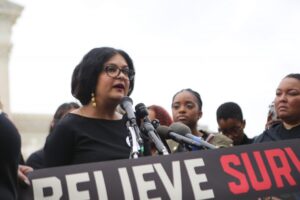These remarks were given by numerous advocates working in the field of gender-based violence at a rally opposing Supreme Court Nominee Brett Kavanaugh. These are remarks given by Qudsia Raja. For full coverage of the rally, please click here.
 Good afternoon. My name is Qudsia Raja, and I’m speaking today as a survivor, as an advocate, and as a board member of Collective Action for Safe Spaces (CASS), an organization working to make DC safer for everyone by using comprehensive, community-based solutions through an intersectional lens to eliminate public gendered harassment and assault in the DC metropolitan area.
Good afternoon. My name is Qudsia Raja, and I’m speaking today as a survivor, as an advocate, and as a board member of Collective Action for Safe Spaces (CASS), an organization working to make DC safer for everyone by using comprehensive, community-based solutions through an intersectional lens to eliminate public gendered harassment and assault in the DC metropolitan area.
CASS is here today in support of Dr. Christine Blasey Ford, of Deborah Ramirez, of Anita Hill, and of all survivors that have spoken out against their abusers, as well as those that have not, those that swallow their trauma day after day because it is not safe for them to speak out. We believe you.
One of the powerful truths about the #MeToo movement is that it amplifies a shared experience of being violated, frequently by men who are exerting power and control. Truly, this movement has created space for many survivors to share their truths, to share their stories, to share their pain that they’ve carried with them for so long, often in silence. At the same time, we have to remember when we say ‘me, too’, that not all of our experiences are the same, and that we need a movement that is inclusive of all experiences – the ones that may make us uncomfortable, the ones that don’t neatly fit inside a boxed in definition of what a survivor looks like. Like the experiences of sex workers who are criminalized for what they do to
survive and are in turn sexually assaulted by police, often without facing consequence. Like the experience of youth detained and separated from families and then sexually assaulted by guards in prisons and detention centers, also without hope of any recourse or accountability.
We need to take the experiences of all survivors into account in order to guide real solutions that are rooted in building safety rather than seeking punishment. We need to rethink what we mean when we talk about safety, what we mean by this word,
who it takes in and who it cuts out. Who do we have in mind when we’re thinking of policies to put in place to keep communities safe? What communities are we keeping out when we limit our understanding of safety to criminal justice responses for survivors of violence? For so many survivors, safety means housing, safety means an end to criminalization of the strategies we use to survive, safety means resources, safety means being believed. Safety means that the person who sexually assaulted you doesn’t get to be the same person who makes rulings about your bodily autonomy.
Amidst all the think pieces on this particular issue over the past several weeks, there has been a lot of conversation about the impact of possibly not confirming Kavanaugh, what that would mean for him. That it would basically be a form of punishment. We’re here to clarify for anyone that thinks this, that not getting confirmed is not a punishment. It would be a consequence of actions he choose to make, and it would be in the best interest of building safety.
At CASS, we don’t believe that punishment or the criminal legal system will lead to safety. We believe in collective responsibility for community safety, and it’s on all of us to speak up to keep each other safe.
Qudsia Raja is a board member of Collective Action for Safe Spaces (CASS). She also serves on the Strategic Advisory Board for Community Justice Reform Coalition, and is the Policy Director at the National Domestic Violence Hotline.
—

Leave a Reply